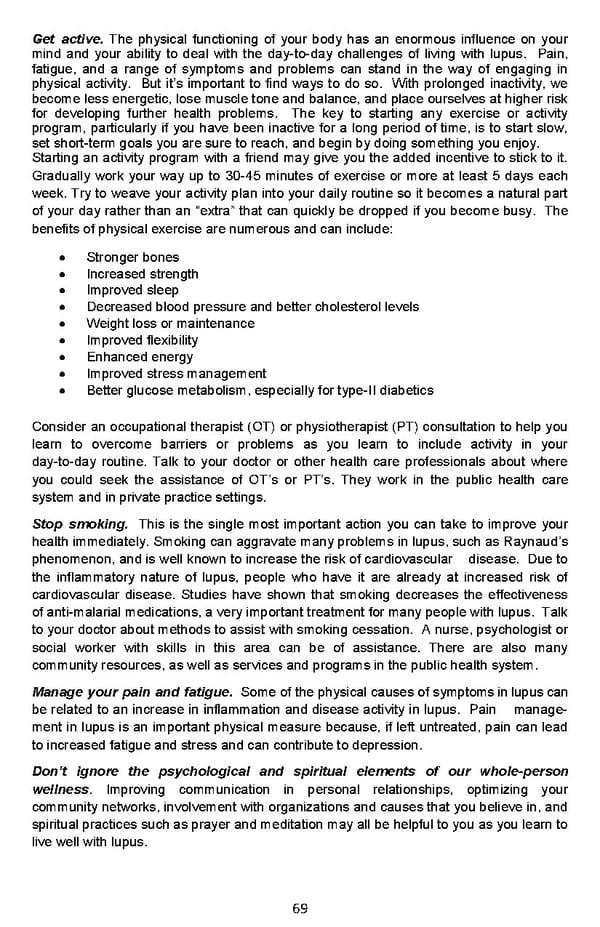Get active. The physical functioning of your body has an enormous influence on your mind and your ability to deal with the day-to-day challenges of living with lupus. Pain, fatigue, and a range of symptoms and problems can stand in the way of engaging in physical activity. But it’s important to find ways to do so. With prolonged inactivity, we become less energetic, lose muscle tone and balance, and place ourselves at higher risk for developing further health problems. The key to starting any exercise or activity program, particularly if you have been inactive for a long period of time, is to start slow, set short-term goals you are sure to reach, and begin by doing something you enjoy. Starting an activity program with a friend may give you the added incentive to stick to it. Gradually work your way up to 30-45 minutes of exercise or more at least 5 days each week. Try to weave your activity plan into your daily routine so it becomes a natural part of your day rather than an “extra” that can quickly be dropped if you become busy. The benefits of physical exercise are numerous and can include: • Stronger bones • Increased strength • Improved sleep • Decreased blood pressure and better cholesterol levels • Weight loss or maintenance • Improved flexibility • Enhanced energy • Improved stress management • Better glucose metabolism, especially for type-II diabetics Consider an occupational therapist (OT) or physiotherapist (PT) consultation to help you learn to overcome barriers or problems as you learn to include activity in your day-to-day routine. Talk to your doctor or other health care professionals about where you could seek the assistance of OT’s or PT’s. They work in the public health care system and in private practice settings. Stop smoking. This is the single most important action you can take to improve your health immediately. Smoking can aggravate many problems in lupus, such as Raynaud’s phenomenon, and is well known to increase the risk of cardiovascular disease. Due to the inflammatory nature of lupus, people who have it are already at increased risk of cardiovascular disease. Studies have shown that smoking decreases the effectiveness of anti-malarial medications, a very important treatment for many people with lupus. Talk to your doctor about methods to assist with smoking cessation. A nurse, psychologist or social worker with skills in this area can be of assistance. There are also many community resources, as well as services and programs in the public health system. Manage your pain and fatigue. Some of the physical causes of symptoms in lupus can be related to an increase in inflammation and disease activity in lupus. Pain manage- ment in lupus is an important physical measure because, if left untreated, pain can lead to increased fatigue and stress and can contribute to depression. Don’t ignore the psychological and spiritual elements of our whole-person wellness. Improving communication in personal relationships, optimizing your community networks, involvement with organizations and causes that you believe in, and spiritual practices such as prayer and meditation may all be helpful to you as you learn to live well with lupus. 69
 Living Well With Lupus Facts Booklet Page 68 Page 70
Living Well With Lupus Facts Booklet Page 68 Page 70